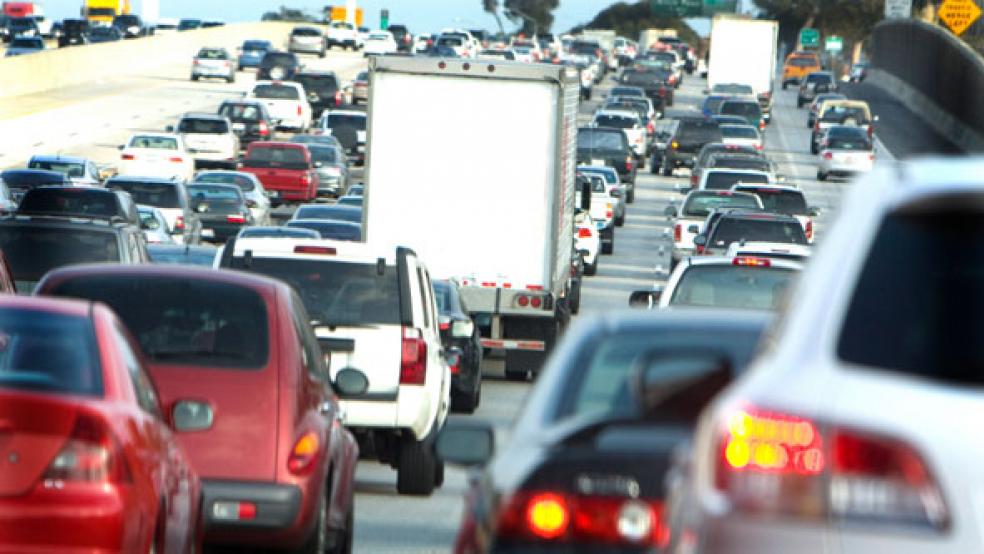Not long ago, the fight on Capitol Hill over financing a new highway bill shaped up as an epic clash between Democrats calling for increased tax revenues and Republicans insisting on spending cuts for people receiving both unemployment insurance and Social Security disability benefits.
But with the highway trust fund about to go broke, and a long summer vacation beckoning, House and Senate leaders are trying to strike a deal to use budget gimmicks to keep federal transportation dollars flowing to the states that enable Congress to do what it does best – spend now and pay later.
Related: Ten States with the Worst Highway Spending Woes
The House Ways and Means Committee got the ball rolling Thursday afternoon by approving by voice vote a transportation funding package that would provide nearly $10 billion to replenish the highway and mass transit trust fund for nearly another year, according to The Hill. The bill will be taken up by the House next week; Speaker John Boehner (R-OH) indicated he would support it.
To offset the cost of the highway measure, the bill approved by Ways and Means would extend some customs fees on importers that are about to expire; shift about $1 billion from a separate trust fund meant to fix leaky underground storage tanks; and change rules governing private pension contributions.
That last measure, called “pension smoothing,” would account for about two thirds of the $10 billion of overall offsets – though some critics and government watchdog groups have denounced it as a “sham” that could cost the government more than it raises in the long term.
Related: John Thune’s Thorny Political Test: Pass the Highway Bill
The manuever, used back in 2012 as part of earlier transportation legislation, provides companies with defined benefit retirement plans a way to reduce their required contributions and, in turn, raise the amount of their tax liability. Budget experts say the proposal could produce a net revenue gain within a 10-year budget framework, but lead to subsequent revenue losses.
“As a result, it would cease to function as an offset, and the package would then increase deficits and debt in all future decades,” according to the Committee for a Responsible Federal Government.
The Heritage Foundation said that changing the pension interest rate calculation “could put taxpayers on the hook for bailouts, and increases the deficits that the Pension Benefit Guaranty Corporation runs.”
According to a February Congressional Budget Office estimate, a provision of this sort would raise $17 billion over the first six years, but then lose money afterwards. Those losses over the next five years would reduce the net savings to only $4 billion, according to the Committee for a Responsible Federal Government.
Related: 700,000 Jobs at Risk If Highway Trust Fund Falters
The Senate Finance Committee followed suit later in the day by approving a similar package. But the legislation drafted by Chairman Ron Wyden (D-OR) and ranking Republican Orrin G. Hatch (R-UT) scaled back the pension provision and adopted other measures meant to force enhanced compliance with existing tax law, according to The New York Times.
Congressional leaders at one time had high hopes of passing a new six-year, $100 billion transportation funding bill, but now must settle for a short-term measure that averts a calamity in the states’ infrastructure construction program in summer and fall. Most highway trust fund revenues come from an 18.4-cents per gallon gas tax that hasn’t been raised since 1993 and can’t keep up with rising construction costs.
State highway officials already have begun cancelling hundreds of new projects for the summer in anticipation of the trust fund’s going belly up. The Department of Transportation has warned it will begin turning off the spigot of federal dollars to the states before the month’s end, potentially jeopardizing 700,000 construction jobs and undermining the economic recovery.
Senate Environment and Public Works Chair Barbara Boxer (D-CA) and Wyden say they are committed to getting a long-term funding bill passed before year’s end, while some Republicans optimistic that the GOP will regain control of the Senate in the November mid-term election favor waiting until next year.
Related: Americans Face a Bumpy Road As Highway Bill Stalls
Rep. Dave Camp (R-MI), chairman of the Ways and Means Committee, said in a statement the short-term House bill “is a much better approach than any proposal to just get us through the end of this year.” “These are policies everyone at the dais is familiar with, they are policies that will provide the funding we need, and they are the only policies that will pass both the House and Senate in time to fund the trust fund after the end of this month,” he said. “So, I see no reason why we cannot work to get this done right away.”
But Sen. Bob Corker (R-TN) called the House and Senate bills an “embarrassment” and a manifestation of political “cowardice.” “Republicans criticized heavily the health care bill that the president put forth because he had six years’ worth of cost and 10 years’ worth of revenues,” Corker said, according to The New York Times. “What the highway bills that I’ve seen coming out of both bodies do so far is they spend it over six months, not six years, pay for it over 10. It’s absolute generational theft.”
Top Reads from the Fiscal Times:





